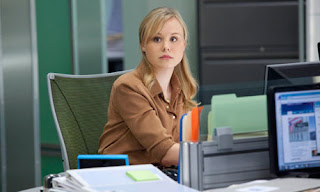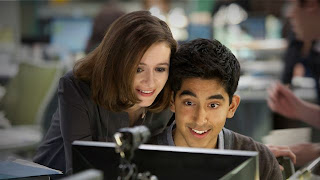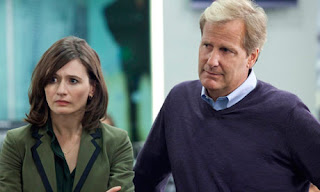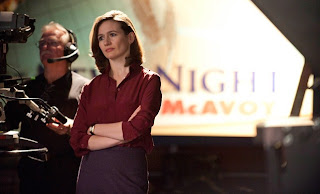Okay. I’m a little behind on the zeitgeist. The Newsroom only just aired last night
on HBO here, so I’ve just gotten a taste of the show and I’m now frantically
tracking down the next episodes because this is a super fun show about people
who care deeply about things. And I like that. It’s what makes Sorkin a great
writer, and what makes him interesting artistically.
But here’s what I’ve noticed so far about his stuff. He’s a
little…hung up?
I guess what I’m saying is that after watching The Newsroom and Studio 60 on the Sunset Strip and The Social Network and Sports
Night, I’m starting to notice a trend. Specifically, a character trend.
More specifically, an ex-girlfriend trend.
You see where I’m going with this?
 |
| Jeff Daniels looks the way Sorkin wishes he looked. |
In an alarming number of his shows and movies, Aaron Sorkin
chooses to focus on a male straight white protagonist (which is sadly par for
the course), and that straight white male protagonist (who is also probably
very privileged) has an evil ex.
Aside from sweeping assumptions about the state of Mr.
Sorkin’s relationships and mental health, what this gives us is a trove of
characters who exist solely in relation to the male protagonists. Now, I’m not
denying that Sorkin is a great writer. I’d have to be crazy to do that. But I
am saying that he’s got a problem with writing women who exist independent of
men.
Let’s look at The
Newsroom since that’s the most recent, shall we?
In this show the protagonist is clearly Will. It’s Will’s
actions that set the plot going, and it’s his issues that keep it there. Since
Will decided to open his trap and give his honest opinion in an interview, he’s
now got to find a new Executive Producer for his show. And in walks Mackenzie,
a bright and talented woman just back from Afghanistan, who happens to be his
ex.
Here’s the deal: Will did not need to have dated Mackenzie
to dislike her. Sorkin could have had him hate her because they clashed when
they last worked together. Maybe she stole his dream job. Maybe he’s just too
resistant to change and insists that they find someone more suitable to his old
way of doing things. Maybe he just doesn’t like her.
But Sorkin went with the ex thing. This colors their
relationship in a couple of important and irritating ways. First, it means that
all of their interactions are subtextually about their failed relationship.
Some people would approve of the tension this adds, but personally, it makes it
all less interesting. If it’s a power struggle about sex, it’s less appealing
to me than if it’s a power struggle about the appropriate way for a broadcast
to run.
Second, it means that all of the references to them from the
staff have to do with their failed relationship. In the second episode, when
Mackenzie discovers from Sloan that everyone thinks Will cheated on her. Now,
personally, in this situation, I’d probably just shrug and let it be, because a
whimpering denial is only going to make people more interested in the real
story (which they’ve chosen to keep hidden). But Mackenzie doesn’t do that. She
throws her hands up in the air and freaks out about the importance of denying
it, forcing Sloan, who has a rather important job, to walk around trying to fix
it.
Let us note here two things: one, Mackenzie also has a very
important job that she is choosing to ignore in favor of three year old drama
about her ex, and two, Mackenzie is
the one who has to strenuously deny this in the story, not Will.
This tells us a little something about how Sorkin sees
women. As we can gather from most of his work, Sorkin sees women as a little
flighty, commitment-phobic, and bad at handling two things at once. Seriously.
Think about it. Even the women he shows that are supposed to be confident and
interesting, like Mackenzie or Felicity Huffman from Sports Night, or Allison Janney on The West Wing are a little flakey, and more than a little neurotic.
It also shows us that Sorkin thinks women should bear the
brunt of the relationship storylines. While Will is out stressing about his
ratings and the future of the show, Mackenzie is running around like a chicken
worrying about how people see her. Even take the minor character, Maggie, whose
whole storylines revolve around her boyfriend, Don, and the guy who wants to
flirt with her so that she sticks around and Don is helpful, Jim.
 |
| Stop hurting feminism. Please. |
Just typing that made me feel skeezy.
And then there’s the final thing we can garner about Sorkin’s
view of women: they are always supporting or undermining men.
Again, think about it for a sec.
Mackenzie’s whole job is to make a news show. A great news
show. But in her interpretation of that, it means convincing Will that he
should stand up for himself. Being his cheerleader. Fighting for Will to make the hard calls, while she
backs him up.
The women are the producers, behind the scenes, always ready
with a helping hand or a strong piece of advice, so that the men can go out in
front of the lights to make things happen.
That’s Sorkin’s world. That’s what women are to him. Backup.
And also, apparently, his ex-girlfriends.
 |
| This would be a much cuter couple. |
Now, this isn’t going to make me stop watching The Newsroom. I have other problems with
the show too, about how cynical it is, the cheesiness, and the irritating sense
of watching people report on stuff that happened two years ago.
But the way that he treats women irks me. It’s weird and
specific, and frankly insulting.
We aren’t just backup to help a man pull off a show. And,
frankly, the Executive Producer would have a lot more power than the star of a
show like this. The EP decides what to cover, the anchor is supposed to shut up
and look pretty, and read his damn lines. Maybe they’re trying to make a point,
but all it’s doing is making Mackenzie look bad.
And I’m pretty sure that’s on purpose.
So, to close out, here’s an open letter to Aaron Sorkin:
Dear Aaron,
Hi. You seem like a nice guy, I guess. I’m glad you’ve
stopped doing all those drugs. Good for you.
But you need to stop taking your relationship problems out
on your characters. Why don’t you call your ex instead? Or, if that’s too hard,
talk to a licensed professional about these feelings. I’m sure she was a bitch
and she broke your heart, but please, please stop writing about it.
It’s getting boring.
Best wishes,
Me
 |
| Actually, Olivia Munn is pretty great in this show. Like the one good female character. |




No comments:
Post a Comment